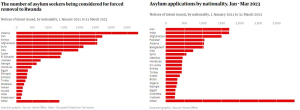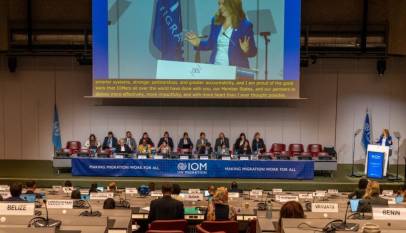BLOG | X-raying the harrowing challenges of African migrants, at home and abroad
Yavi Madurai blogs about the ongoing UK refugee crisis in relation to the UK-Rwanda asylum deal, vis-à-vis South Africa’s decision to end the Zimbabwean Exemption Permit (ZEP), in the context of the potential role of the African Union Free Movement Protocol (AU-FMP) in addressing Africa’s free movement and labour migration challenges.

There is a refugee crisis playing out in the United Kingdom, where the Home Office plans to send more than 24,000 asylum seekers from about one-third of the world’s countries to Rwanda. However, this plan is currently enmeshed in a legal challenge as the UK’s Court of Appeal declared it unlawful on Thursday, June 29!
The forceful removal plan is dubbed the “Stop the Boats” campaign by the anti-asylum protestors, in reference to the small boats with which the refugees arrive in the UK seeking asylum. Hundreds of thousands of refugees and asylum seekers, including torture survivors, from around the world, including countries like Iran, Eritrea, Syria and Sudan are currently languishing in the UK’s asylum system.
Steve Smith, CEO of the refugee charity Care4Calais, told the UK Guardian that over two-thirds of the refugees they work with who did receive Rwanda notices have “reported indicators of modern slavery and torture.” Smith therefore described as “shameful” the fact that, despite creating a record backlog of asylum claims due to inefficiency in processing them, the UK government had paused tens of thousands of others.
In its ruling, the court described the UK-Rwanda asylum deal as contravening the European Convention on Human Rights. John Crace, the Guardian’s parliamentary sketch writer, describes UK Home Secretary Suella Braverman as someone who doesn’t “count sheep” but rather “human misery. Nothing can replicate the thrill of seeing a frightened and desperate person finding themselves in a processing centre in Kigali. The more she can count, the better she sleeps.”
An analysis of the data on asylum seekers shows at least 25% of the 24000 refugees destined for Rwanda are from African countries. This is very peculiar: Africans from Eritrea, Sudan, Somalia, amongst others, would rather risk their lives embarking on the harrowing journey to the UK – instead of seeking asylum in a neighboring African country. Now, they will be sent back to the African continent if the UK Government eventually has its way.
Before we judge
As Africans, before we judge one of the continent’s former colonizers, we should turn our attention to another court case closer to home. On June 28, the Pretoria High Court declared South Africa’s Minister of Home Affairs Aaron Motsoaledi’s 2022 decision to terminate the Zimbabwean Exemption Permit (ZEP) for migrants fleeing to South Africa due to Zimbabwe’s economic and political strife “unlawful, unconstitutional and invalid”.
Motsoaledi’s decision sought to terminate the ZEP and grant a limited extension of the ZEP for only a 12-month period not beyond June 30, 2023. The High Court’s decision followed a legal case by the Helen Suzman Foundation and the Consortium for Refugees and Migrants in South Africa (CoRMSA).
As the more than 200,000 Zimbabweans who now call South Africa home await their fate, one can only imagine the state of minds of the ZEP beneficiaries, who do not seem to have a true home. Millions of other Africans are in the same quagmire, either because their home countries have become classical failed states like Zimbabwe or even complete war zones like Somalia and Sudan.
This is all happening in an Africa that is supposed to have “silenced the guns” by 2020, and created a unified continental market where people, goods and services move freely, i.e the Africa We Want! It is sad that these grand visions contained in various declarations, treaties and campaigns, have not yet come to fruition even though some of them were conceptualized 60 long years ago.
“Free” not “Unregulated” movement
The African Continental Free Trade Area (AfCFTA) is a visionary initiative, hence the tendency to view it as a silver bullet that will create Africa’s economic prosperity. Yet, the operationalization of the ‘Single African Market’ may face a huge challenge if people are not allowed to move freely with their goods and also to deliver services. This is due to African countries’ notoriously restrictive border control measures and failure to activate the AU Free Movement Protocol (AU-FMP) and its accompanying African Passport.
The ongoing ZEP debacle playing out in South Africa could be resolved within the context of the FMP, but South Africa is not even a signatory to the FMP, let alone ratifying it. The refusal to sign and ratify the Protocol by South Africa and a significant majority of African countries is most likely for the same reason: a lack of understanding of the FMP. There is an erroneous perception among policymakers in African countries that the FMP is about “unregulated movement.
That is not the true story. The various articles of the Protocol are very clear on the regulations that govern cross-border movement of the continent’s people under FMP rules. They provide for a transparent and flexible framework for state parties to operate, including clauses for “expulsion, deportation, and repatriation” as contained within Article 21 of the FMP. The Protocol allows for limited implementation and temporary suspension of certain provisions by State Parties when the need arises.
No doubt, having a continental legal framework guiding AU Member States on how to manage free movement and labour migration such as the FMP will help African countries like South Africa better manage situations such as that of the Zimbabwean migrants. The irony of South Africa’s move against the Zimbabweans is that the country is at the same time one of the frontline promoters of the boosting intra-African trade mantra through AfCFTA.
One wonders how a country that is not comfortable with having economic migrants within its borders will at the same time be at the vanguard of efforts pushing for the liberalization of trade on the continent. This is because it is people and not robots that trade; hence, trade liberalization is only possible if people are able to move freely. The AfCFTA is a huge opportunity for South Africa to attract not only African investment but also boost its tourism potential by attracting African visitors.













